#salsburg
Explore tagged Tumblr posts
Text
Bonnie “Prince” Billy, Nathan Salsburg & Tyler Trotter — Hear the Children Sing the Evidence (No Quarter)

How can you make two strangely transcendent songs originally written and recorded by Lungfish even more metaphysically oblique? Apparently, you set Will Oldham (appearing here under his long-standing Bonnie “Prince” Billy appellation), Nathan Salsburg and Tyler Trotter to work, with few limitations on studio time. The two album-side-long covers — of “Hear the Children Sing” from Lungfish’s Love Is Love (2003), and of “The Evidence” from Pass and Stow (1994) — find a weirding place, somewhere between transfixing and trance-like. The effect is more magical and peculiar than any of those adjectives can suggest.
The expansive lengths of the performances (just shy of 20 minutes for “Hear the Children Sing” and just over 21 minutes for “The Evidence”) create a number of rich textures and musical phenomena. Principal among these is the music’s repetition — the simple melodies of Salsburg’s prettily plucked guitars, the understated percussive programming from Trotter and Oldham’s cycling through the lyrics, from Lungfish’s resident visionary and spiritual troublemaker Daniel Higgs. Oldham practices a jealous fealty to the original lexical choices and syntax, but he alters his vocal phrasing slightly here and there as he runs through the lyrics for both songs at least four times, his tenor simultaneously buttery and airy.
With repetition, some snatches of lyrics and certain words acquire curious qualities. Often they strive toward a sort of pure sound, leaving some — if not quite all — of their capacity to mean behind. The words empty, attempting to register only as strings of phonemes. The effect is something like reading Gertrude Stein, especially some passages of The Making of Americans. That’s interesting, but even more intriguing are the phrases and clauses that retain their insistent significations, in spite of the numerous repetitions. See the sort-of refrain of “Hear the Children Sing”: “Oh, the devil is a flower / Plucked from a cloud.” The array of metaphors there, operating with ambiguous relation to everyday idioms, seems primed for emptying. But the symbolic power of Higgs’ figures persists. Nothing coheres, precisely, but you can’t stop thinking about what the words might mean. They are too potent to mean nothing.
Both performances are lovely and odd (and they are rendered distinct by flourishes from other musicians recruited into the sessions: Zak Riles’ unobtrusive banjo picking in “Hear the Children Sing,” Ned Oldham’s gentle, pellucid electric guitar in “The Evidence”). But it’s Oldham’s singing and Higgs’ lyrics that make Hear the Children Sing the Evidence so memorably discomfiting. These lyrics from “The Evidence” are suggestive: “If you’re outside the lingo / If you’re outside the jargon / You talk beyond a system / You’re talking out of turn.” Establishing a position outside of the specialized “jargon” of Western discourses of rationality and “evidence” seems to be one of the intentions of these songs. But their repetition inevitably creates a “system” in which things (the sound of notes, the pluck of a string, the arrival of a lyric) unerringly come in their turn.
Perhaps the repetition itself wants to project us outside of those systems, into a transcendent, entrancing beyond. Perhaps it does. Perhaps these are the wrong questions to ask. The music doesn’t care. It’s too busy being beautiful.
Jonathan Shaw
#bonnie “prince” billy#nathan salsburg#tyler trotter#hear the children sing#the evidence#no quarter#jonathan shaw#daniel higgs#lungfish
10 notes
·
View notes
Text

Interviews 2024
Sometimes, I talk to musicians! This year, I had conversations with some great ones — Linda Thompson, Bob Holmes (Suss, numun, etc), somesurprises, Danny Paul Grody, James Elkington & Nathan Salsburg, Zachary Cale, and Crazy Horse's Billy freakin' Talbot. I always wish I was a little bit better at the art of conversation, but hopefully, these chats are entertaining/interesting enough.
You can decide for yourself over on Aquarium Drunkard — which as mentioned many times before, has gone behind the paywall this year. But as also mentioned many times before, your membership fee is worth it ... think of it as subscribing to many e-newsletters/substacks all at once? Beyond my own Q&As, there have been a ton of sweet talks this year, from Jeff Parker to Thurston Moore to Rosali to J Spaceman to The Necks to Guy Picciotto to Pat Metheny to Jessica Pratt and many many more. (And that's not even counting Jason P. Woodbury's always awesome Transmissions podcast). Sign up!
Linda Thompson
I just liked that kind of sad, keening music. I think keening is the word, you know? Most people hate [that kind of music]. I mean, most people hate the bagpipes. I love the bagpipes, so there’s obviously something very wrong with me. [Laughs]
Bob Holmes
The vibe is a big part of it—that big sky, open feeling, creating a musical experience that that is very open. The word inclusive shows up a lot. Inclusive of musical genres, yeah, but also men, women, transgender, different races. I always say that the thing about ambient country is that it’s a big country. There’s plenty of space.
somesurprises
For me, it’s about trying to be someone who’s open to change — whether that’s personally, politically or globally. That’s the most centered reality. Cynicism and just believing that things have to be done the way they’ve been done in the past, or that someone else has to get the short end of the stick for them to benefit — those are actually twisted versions of reality.
Danny Paul Grody
I changed so fundamentally when I became a parent. It impacts everything, every aspect of my life. You know, it was one of the greatest gifts I could ask for, just to take my focus off of myself. I didn’t realize what a gift it would be, but it’s taught me a lot. But it’s also taught me how to really cherish those things in my life that matter, that bring meaning, that bring me a sense of wholeness. Music is one of those things, obviously.
James Elkington & Nathan Salsburg
I find that as I’ve made more records and written more songs, I’ve become a much more sympathetic listener. My tastes have only broadened as I’ve gotten older. My early records — both with Jim and without — were reflections of more limited influences, or the desire to only have certain influences present. That’s definitely changed. In some ways, we don’t have anything to prove to anyone anymore.
Zachary Cale
I got to hang out with Michael Chapman a few times and I asked him about that point blank. “Is that one of the reasons why you do it – to mark the span of time?” He said absolutely. I mean, it’s the art of it, too, but these records are how I mark my time. I’ve always been old fashioned that way. I think most musicians who are in it for the long haul think of it that way, too.
Billy Talbot
It’s fate. And I don’t even really believe in fate. We probably make our own fate, as we move along in this life. There seems to be some kind of other plan for us that we latched onto. But I’m not sure about that. All I know is that it happened. And I’m grateful. Grateful to have been a part of it.
#aquarium drunkard#linda thompson#neil young & crazy horse#zachary cale#danny paul grody#nathan salsburg#james elkington#somesurprises#suss
5 notes
·
View notes
Video
youtube
Bonnie "Prince" Billy · Nathan Salsburg · Tyler Trotter - Hear The Children Sing
3 notes
·
View notes
Text

2 notes
·
View notes
Text
Jamie Raeburn recording
On the Alan Lomax Digital Archive there's now an exhibit about the 1951 Edinburgh People's Festival Ceilidh, which Lomax was on hand to record.
The exhibit includes a specially commissioned recording by Alasdair of the song Jamie Raeburn, which featured in the 1951 event. Alasdair is accompanied by Neil McDermott on fiddle. You will need to scroll down the page quite a lot - past many familiar names - to reach the recording.
I'm guessing there are more details about this in the podcast by archivist, guitarist and occasional patron of Alasdair's, Nathan Salsburg. However, I have yet to listen to the 2+ hours of the episode.

0 notes
Text

Seeking out a little bit of tranquility during the first throes of fatherhood, the Kentucky-based guitarist, composer and curator Nathan Salsburg settled his daughter Talya in the crook of his arm and discovered that he could stretch the moment. Recalling the song ‘The Evidence’ by Lungfish which he had learned to play by heart in his youth, Salsburg realised that he could play the guitar part by noodling with one hand while the other rocked Talya gently to sleep. ‘It was therapeutic and calming and just lovely for me’ he says, and even more importantly it worked on her, especially as Salsburg turned the five-minute post-punk track into a fathomless ten-minute or twenty-minute or even hourlong mantra.
https://culturedarm.com/bonnie-prince-billy-nathan-salsburg-and-tyler-trotter-hear-the-children-sing-the-evidence/
0 notes
Text
James Elkington & Nathan Salsburg Interview: Poise, Levity, and Easygoingness
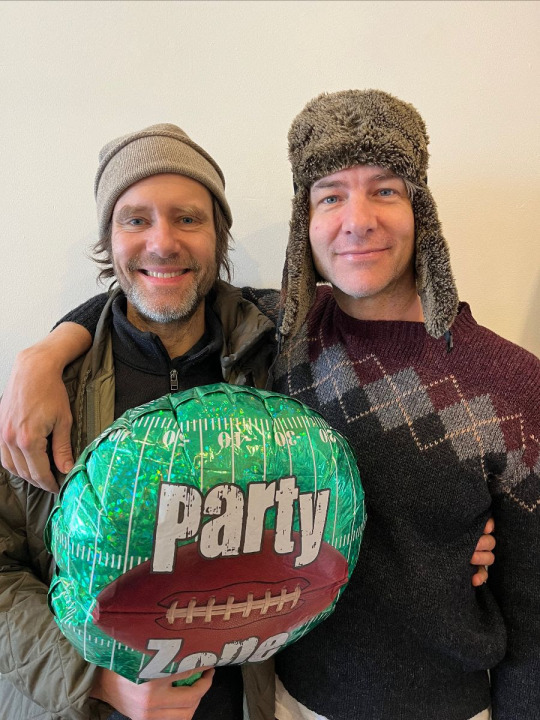
Photo Credit: James Elkington and Nathan Salsburg
BY JORDAN MAINZER
All Gist (Paradise of Bachelors), the third album of guitar duets from exploratory, thoughtful players James Elkington and Nathan Salsburg, sounds like what it is: two longtime friends and collaborators playing together, equal parts casual and focused. Since their 2015 album Ambsace, each has been busy, separately and together. Elkington's released three solo albums, played as part of Eleventh Dream Day, Brokeback, and Jeff Tweedy's live band, and recorded with Steve Gunn, Nap Eyes, and many more. Salsburg's dropped a bevy of albums and has played on records by Bonnie "Prince" Billy, Shirley Collins, and others. Meanwhile, the two have come together on four records by Salsburg's partner Joan Shelley, and Elkington produced Salsburg's Psalms, his 2021 album of arrangements of Hebrew psalms. Their duo records, however, are born of the most natural collaboration, each bringing to the table melodies they think--perhaps know--the other will respond to, combining them, and being open to feedback or changing gears entirely.
All Gist, specifically, carries the distinct quality of the Chicago winter during which it was recorded: You can picture Elkington and Salsburg sitting around the kitchen table, each culling from their vast repertoires and tendencies, creating something to warm their bodies and hearts and perk their heads and ears, unaware of any blusters outside. The songs are reflective of their shared artistic interests and inspirations, and they're rounded out by the presence of musical contemporaries with whom each has fostered relationships over the years. Opener "Death Wishes to Kill", which takes its title from T.F. Powys' Unclay, sports lilting guitar melodies that offer an affable sway, along with Wanees Zarour's violin solo. The minimal "Explanation Point" bounces along a groove that sounds bigger than it is, almost gestalt, as Jean Cook's strings and Anna Jacobson's brass shimmer. Moments of percussion come from other instruments like hand drums ("Long in the Tooth Again"), along with Wednesday Knudsen's woodwinds ("Nicest Distinction"), or as part of the sheer tactility of guitar scrapes and textures. The self-reflexive "Numb Limbs" gets its title from the physical aftereffects of playing a song that took forever to come together; you feel the spritely guitar picking and breakneck tempo in your own fingers.
Of course, All Gist has a few interpolations, namely a gentle, quiet, start-stopping version of Howard Skempton's "Well, Well, Cornelius" and a taut, concise combination of two traditional Breton dance tunes in "Rule Bretagne". Easily, the most unexpected song on the album is a version of Neneh Cherry's classic late 80s jam "Buffalo Stance". Oscillating and slowed down to an expanse, one guitarist plays Cherry's lyrical line, the other the song's instrumental melody, making something both recognizable and nostalgic as well as emblematic of the duo's adventurous nature. That combination, indeed, is the gist of Elkington and Salsburg.
Earlier this month, both guitarists answered some questions over email about All Gist, their creative process, covering songs, and their sometimes-overlapping, oft-diverging taste in art. Read their responses below, edited for clarity.
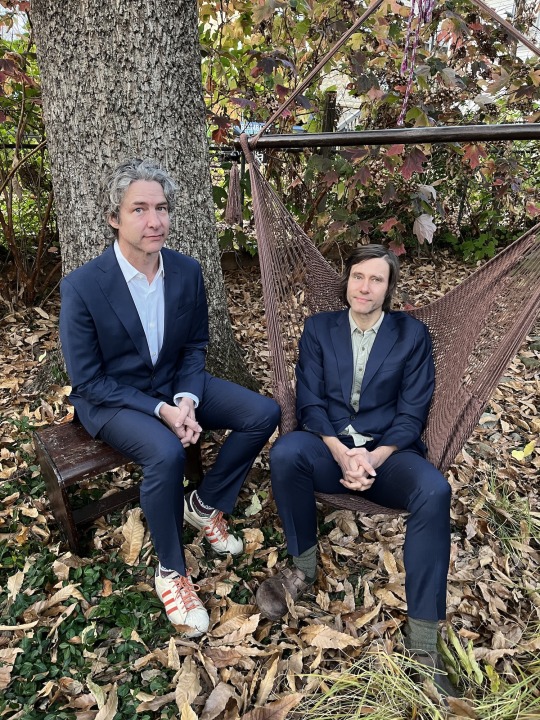
Photo Credit: Joan Shelley
Since I Left You: Why was it time again to make an album together? James Elkington: We’d been talking about it since we made the last one, but the truth is that we’ve both just been too busy. I started making solo records again after the last one, plus I got to produce one for Nathan, and we both help out with Joan Shelley’s records, so it never felt like we weren’t working together anyway. We were just working on projects in a different way. I think that Nathan and I both think there’s something about the duo’s music that is different from the other things we do, so we were keen to get back to it at some point. Fortunately for us, we got an invitation to play at a guitar festival in Chicago, and we used that as an excuse to start working on new material. I should also mention that our wives kept bugging us to do it again.
SILY: How was your collaboration on All Gist unique as compared to your other records together, and how was it similar? JE: We hadn’t played together like this for something like 7 years, so I was interested to see if we could even do it. But our writing together was as quick and easy as it ever was, and in that sense, it was really similar to how we worked before. Nathan has always worked with longer forms than me, but this time, I wanted to follow his lead a bit more in terms of writing longer pieces with less changes and more textures. We weren’t concerned this time with being able to play all of this stuff live, so we left more space for orchestration and overdubs. Nathan Salsburg: We’ve each lived through a world of experiences in the past ten years, musical and otherwise. Now that we’re each squarely into our middle age, I think the poise, levity, and easygoingness that should be attendant on this period of life show up in the music at [the] pitch they didn’t in the past.
SILY: Was there a lot of improvisation in the process of combining the different instrumental motifs you each brought to the recording session? JE: Because we don’t have a great deal of time to work together, we find things go much quicker if we come up with rough musical sketches by ourselves and then present them to the other. Nothing is ever written in stone, and the level of trust is very high. Anything Nathan suggests for one of my ideas is going to improve it. Both of us are more concerned with coming up with something that sounds cohesive and keeping the ball rolling than having any personal agenda for how this thing should be, and we always leave enough space for us to be surprised by what we end up with. I rarely have any idea what Nathan is playing, but I like how it sounds when it’s finished. We did experiment with recording something completely improvised and liked the results, but it sounded like a different record, so we didn’t use it. Maybe that’ll be the next one.
SILY: How or at what point in making each song do you determine whether it needs more musical accompaniment, from other instruments and/or players? JE: That’s a good question, and I’m not sure I have an answer, but the plan seems to be to write a piece that can stand by itself for the two guitars, record that to our satisfaction (which is nearly always the first take we can manage that has all the right parts), then start throwing other instruments at it to see what sticks. Most of that approach is me in my studio adding things and then taking them off again. There are certain pieces where, as were writing them, we can hear that a solo instrument would sound great in a certain part. Wannees Zarour’s solo in "Death Wishes To Kill" was like that. There are songs, like "All Gist Could Be Yours", where for a repeating chord sequence to have the effect we’re going for, its going to need a lot of support from other instruments, and we talked about that as we were writing it.
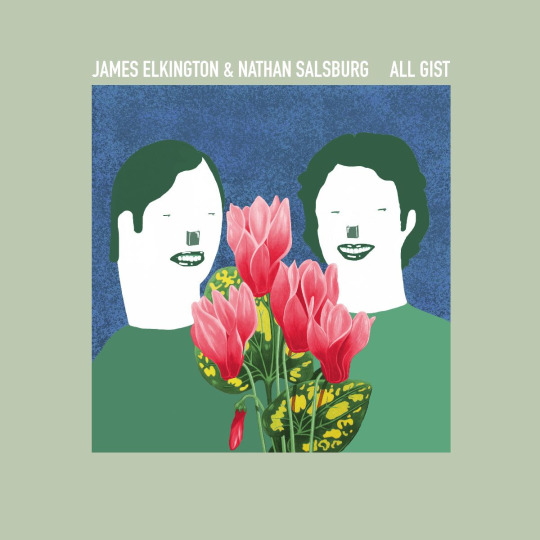
Cover art by Chris Fallon
SILY: Do you have a backlog of other people's songs you think might be fun or fulfilling to cover or reimagine as a guitar duet? What makes a song fit for a cover from your two artistic voices? JE: Well, I’m a little concerned that there’s a potential novelty aspect to our doing a lot of covers, but maybe it's okay. We certainly didn’t go out of our way to think of any for this record. Nathan suggested "Buffalo Stance" early on just because he loved the song and all the parts. I was resistant at first, just because I thought there wasn’t enough there for us to work with harmonically, but there’s so much good stuff going on with the synths and the bassline in that tune that it became more a process of picking and choosing what aspects of the song we wanted to shine a light on, at what time. Our Smiths cover from the last record is like that, too. It switches from the guitar line to the vocal depending on where we’re at or what seems to be most important, so I suppose we have a system for doing this. I think the only criteria we have for picking a song is whether one of us really really likes it and the other one can get their head around it.
SILY: "Death Wishes To Kill" takes its title from a T.F. Powys novel you both read. Do the two of you tend to recommend books, films, albums, etc. to each other a lot? Do you ever find you're about to recommend the same thing to one another? JE: I was going to write that we don’t have a huge amount of overlap, but I’m remembering going to his house when we hadn’t known each other long and being confronted with what appeared to be a wall of my own books. Its not as if we like exactly the same things, but there are some writers and records that we both like that NO-ONE else I can think of likes, so when Nathan suggests a book, I usually get to it pretty quickly. I think Nathan was reading the Powys novel, Unclay, and sent me a screen shot of one of the passages in the book with the caption "this is for you" underneath. He also sent me a link to an Australian liquor store commercial from the early 90’s because he knew it would make me laugh for a day and a half, and it did. NS: I remember we made common cause over Max Beerbohm not long after we met—Zuleika Dobson, maybe—but yeah, we each have some preoccupations that the other couldn’t give much of a shit about. Like, I can’t say mid-century British horror movies do a whole lot for me. I’m remembering when Jim spent the better part of an hour trying to explain the appeal of U.S. Maple, and I can’t say he succeeded. And Jim couldn’t care less about rural American string-bands of the late 1920s. But when we have an overlap—Unclay, say, or the totally under-appreciated Yorkshire singer-songwriter Jake Thackray, or Alan Partridge—and yes, these overlapping things do tend to all be English—it’s always stuff we’re super, super jazzed about.
SILY: Can you tell me about the cover art for All Gist? NS: The artist’s name is Chris Fallon, an old friend of mine from when I lived in New York City 20+ years ago. He’s a phenomenal painter, and I love his figures, his palette, and the scenes/settings that he dreams up. I asked him to create a portrait of us, and this is what he did. He’s never met Jim and hasn’t seen me in quite a few years, but I feel like he nailed something of Jim’s and my dynamic, equal parts earnest, bizarre, silly.
youtube
#interviews#james elkington#nathan salsburg#paradise of bachelors#all gist#james elkington & nathan salsburg#james elkington and nathan salsburg#ambsace#eleventh dream day#brokeback#jeff tweedy#steve gunn#nap eyes#bonnie “prince” billy#shirley collins#joan shelley#psalms#t.f. powys#unclay#wanees zarour#jean cook#anna jacobson#wednesday knudsen#howard skempton#neneh cherry#chris fallon#the smiths#max beerbohm#zuleika dobson#u.s. maple
0 notes
Audio
Listen/purchase: Hear The Children Sing The Evidence by Bonnie "Prince" Billy, Nathan Salsburg & Tyler Trotter
4 notes
·
View notes
Text

albums engineered in a lab to make me, specifically, go insane. two twenty minute lullaby cover salsburg/bpb collab when i've been mainlining nothing but psalms, wolfroy, and i see a darkness this week? take me out now.
3 notes
·
View notes
Text
Despite the progressive politics of early zombie films like George Romero’s Night of the Living Dead, modern narratives about zombies are often strikingly conservative, displaying a world that rewards rugged individualism and presents a pessimistic view of human nature. The recent HBO drama The Last of Us, based on the acclaimed 2013 video game of the same name, exemplifies this tendency. The show takes place two decades after an outbreak of a zombifying fungal infection triggers global societal collapse. In this post-apocalyptic world, a fascist government violently maintains order within walled-off “quarantine zones,” while a brutal resistance group called the Fireflies strives to overthrow them. The Last of Us follows the cynical smuggler Joel (Pedro Pascal) and a teenager named Ellie (Bella Ramsey), who is immune to the fungus, on their treacherous journey to meet up with a team of Fireflies who believe they can use her to create a vaccine. As Joel and Ellie bond against the backdrop of a dog-eat-dog world where no one can be trusted, the show presents a largely right-wing vision in which the only path to redemption is through caring for one’s immediate kin. According to Neil Druckmann—the co-creator of the series as well as the game and its sequel, who spent his early childhood in a West Bank settlement—elements of The Last of Us are informed by the politics of Israel/Palestine. On this week’s episode of On the Nose, editor-in-chief Arielle Angel, managing editor Nathan Goldman, fellow Dahlia Krutkovich, and contributor Hazem Fahmy discuss the politics of the show, its relationship to Israel/Palestine, and its evocations of the Holocaust. Note that this episode includes spoilers for the HBO series, as well as the game and its sequel, which will form the basis of future seasons of the show. Thanks to Jesse Brenneman for producing and to Nathan Salsburg for the use of his song “VIII (All That Were Calculated Have Passed).”
#Spotify#personal nonsense#to listen#really excited to check this out because i've been feeling very inadequate at analyzing the politics of the show
15 notes
·
View notes
Text
James Elkington and Nathan Salsburg — All Gist (Paradise of Bachelors)
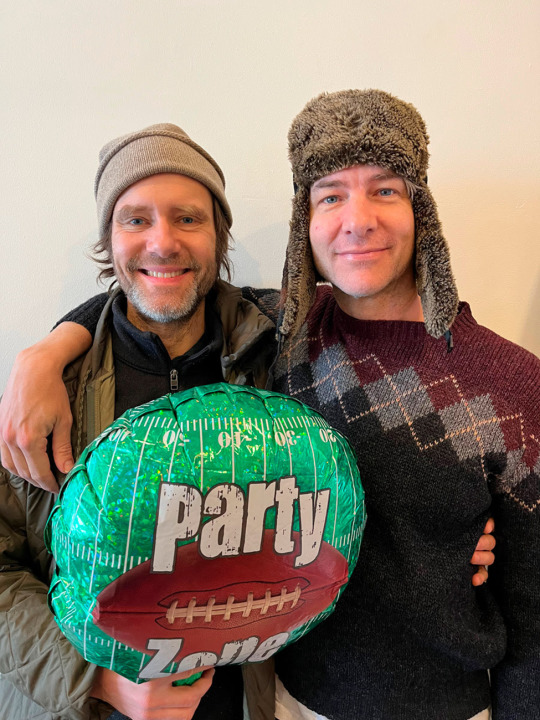
In this third album of guitar duets, James Elkington and Nathan Salsburg perform a complicated sort of dance, their separate instruments executing, light and agile motifs, sometimes in concord, other times slightly out of sync. The melody refracts through their separate interpretations, so that you often feel like you’re hearing it from multiple angles or doubled with an echo. Though some of the songs have a twinge of melancholy, most of them explode with joy. Their two instruments chase each other like dogs at happy play.
Elkington and Salsburg pick up their musical conversation after a long hiatus. Ambsace, their last collaboration, came out in 2015. But like the best reunions, this one is free of awkwardness. They treat each other with warmth and respect throughout. The guitars tangle but never step on one another, each player leaving space for the other.
The pair also makes judicious use of other talent to bolster and deepen their sound. The opener “Death Wishes to Kill” gets a firm grounding from Nick Macri’s acoustic bass; he lends a steadiness to this playful tag in thumps that resonate and mark time without staking too prominent a place for themselves in the sonic mix. But even more striking is the wild skirl of violin that Wanees Zarour adds, wheeling around the guitar line in a throaty emotional timbre. Zarour played on the last Elkington/Salsburg disc. He is a Palestinian-American multi-instrumentalist and academic who teaches at the University of Chicago.
“Nicest Distinction” shows how the foundation that Elkington and Salsburg lay down can be opened up and expanded. It begins in stately ritual, a madrigal with a little blues introduced in the way the phrases end with a vibrating bent notes. It’s just the two of them for a good long while, one strumming splayed chords, the other picking a melodic path in and among the meditations. Yet this long piece kicks into a gallop towards the end, with wild tom-tom fill and woodwinds played by Wednesday Knudsen.
All Gist will likely be lumped into the folk category, being acoustic and not quite modern. Still there is really only one actual folk tune on it, the mortality-shaded frolic of “Rule Bretagne,” based, per the title, on the music of seagoing France. Well, maybe not. “Explanation Point” digs pretty deep into country blues, the notes sliding and tumbling down a sunlight rambling path. Here, as elsewhere, melodic lines zing off each other then carom back for a moment of concord.
But really, the most interesting cuts veer the furthest from conventional folk. “Well, Well Cornelius,” originally written for piano by the British composer Howard Skelton, offers a radiant procession of chords framed by the regular architecture of picking. It is serene and unhurried and really quite beautiful. So, is “Buffalo Stance” a Neneh Cherry song you might remember for its pop-locking hip hop beat and strobe lit video. These artists distill it down to melody—a tune you might not have focused on the original, very different version—and transform the cut into a gentle, bucolic ramble. Ironically, in the video, Neneh introduces her song with an aside of “how melodic” which feels like sarcasm, but these two guitarists heard it there all along. Just lovely.
Jennifer Kelly
#james elkington#nathan salsburg#all gist#paradise of bachelors#jennifer kelly#albumreview#dusted magazine#guitar duets#neneh cherry#howard skelton#finger picking
4 notes
·
View notes
Text

James Elkington & Nathan Salsburg - First Unitarian Church of Philadelphia, Philadelphia, Pennsylvania, October 22, 2015
Head over to Aquarium Drunkard to read my conversation with six-string kings James Elkington and Nathan Salsburg, whose brand-new All Gist (out now on Paradise of Bachelors) is one of my favorite records of 2024 thus far. These guys aren't just extraordinary guitarists, they're also very nice dudes.
As mentioned at the tail-end of the interview, Jim and Nathan are planning some live Gist gigs in the coming months — their first real tour since 2015! To get prepped for that, check out the above video from back in those days, expertly filmed by Elkhorn's Jesse Sheppard. If you're a guitarist, it'll be fun (and perhaps frustrating) to see how casually Elkington and Salsburg dispatch these intricately detailed tunes. Unfair!
And how's about Aquarium Drunkard?! We're a couple weeks into the new age, with memberships rolling in fast 'n' furious. Tons of killer stuff going up on the regular, including terrific High Llamas and Shabaka Hutchings interviews, a Lagniappe Session from the Reds, Pinks and Purples, a fresh Bandcamping column ... and so much more! If this is the kind of thing you dig, consider pitching in.
5 notes
·
View notes
Video
youtube
Bonnie "Prince" Billy · Nathan Salsburg · Tyler Trotter - The Evidence
1 note
·
View note
Text
the only song in the world this week
#peter posts#hand sign for everythings fine goodness hard life of mine!#faceless hard god of laughable time...#life line line on mine intertwined with the body in mine#Spotify
8 notes
·
View notes
Text
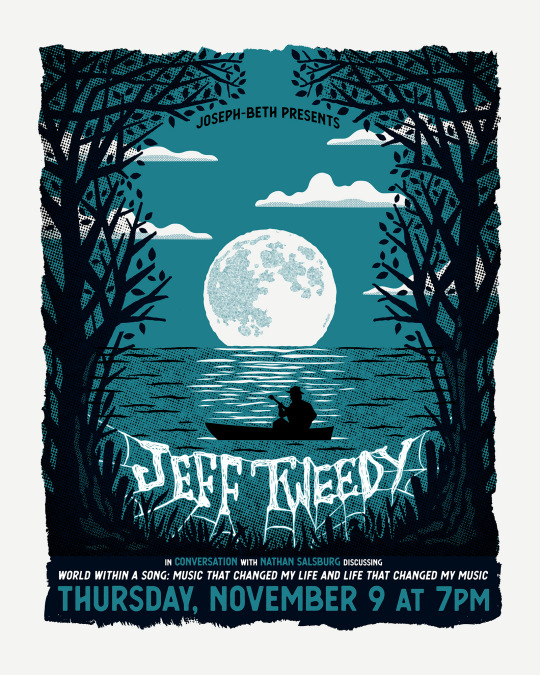
NEW poster for our pals at Joseph-Beth Booksellers for...
Jeff Tweedy: in conversation with Nathan Salsburg discussing World Within a Song: Music That Changed My Life and Life That Changed My Music
Thursday, November 9, 2023 - 7:00pm 3250 Victory Pkwy, Cincinnati, OH45207
Poster Details: 2 color screenprint 16" x 20" Edition of 100 Available at event
#art#illustration#screenprint#printmaking#sharethelex#design#cricket press#joseph-beth booksellers#jeff tweedy#poster art
5 notes
·
View notes